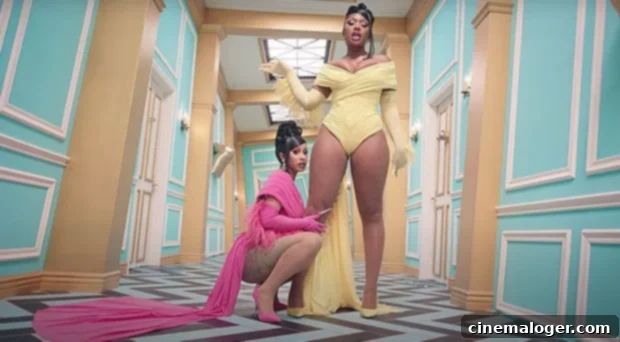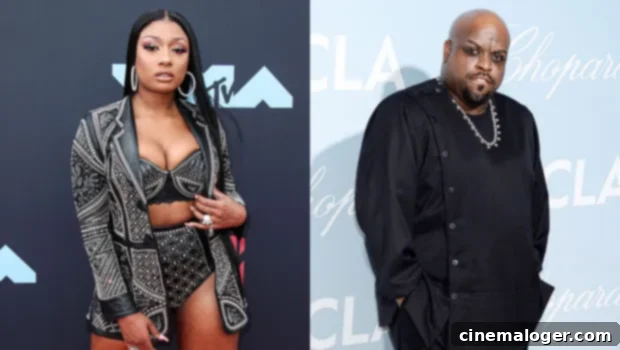Megan Thee Stallion and Cardi B’s ‘WAP’: A Deep Dive into Music’s Double Standards and Female Empowerment
Released in August 2020, Megan Thee Stallion and Cardi B’s collaborative single, “WAP,” exploded onto the global music scene, instantly becoming a cultural phenomenon. Beyond its undeniable chart success and catchy rhythm, the track ignited a fervent debate across social media, political discourse, and the music industry itself. The song, an unapologetic celebration of female sexuality and autonomy, prominently featured explicit lyrics that left little to the imagination. This bold approach, while lauded by many as empowering and groundbreaking, simultaneously triggered a wave of criticism, particularly from conservative commentators and even some figures within the music world. However, Megan Thee Stallion, a vocal advocate for women’s empowerment, wasted no time in addressing the hypocrisy inherent in much of this backlash, highlighting a double standard that has long plagued female artists.
On August 11, 2020, just days after “WAP” dropped, Megan Thee Stallion took to Twitter to eloquently call out the inconsistency she observed. Without explicitly naming anyone, her message resonated widely, particularly given recent criticisms leveled against her and Cardi B. The 25-year-old rapper’s tweet, steeped in both humor and pointed observation, read: “Lol dudes will scream ‘slob on my knob’ word for word and crying abt WAP [laughing face emoji] bye lil boy.” This statement powerfully encapsulated the core argument: why is explicit sexual content celebrated when performed by male artists, yet vehemently condemned when expressed by women?
Lol dudes will scream “slob on my knob” word for word and crying abt WAP 😂 bye lil boy
— HOT GIRL MEG (@theestallion) August 11, 2020
The Pervasive Double Standard in Music History
Megan’s tweet wasn’t just a witty retort; it was a potent commentary on a deeply entrenched double standard in the entertainment industry and society at large. For decades, male artists in genres like hip-hop, rock, and R&B have freely produced music with overt sexual themes, often detailing conquests, fantasies, and explicit acts without facing the same level of moral outrage or scrutiny. Songs about “slobbing on my knob” (a clear reference to Three 6 Mafia’s explicit track) and countless others have become cultural staples, frequently celebrated for their bravado and lyrical wit, regardless of their content. The critique against “WAP,” therefore, highlighted a glaring disparity: when women reclaim their sexuality and express it as boldly as their male counterparts, they are often labeled as “shameless,” “vulgar,” or “desperate.”
This hypocrisy extends beyond just lyrical content. Visually, male artists often feature scantily clad women in their music videos, which is often normalized as part of the “music video aesthetic.” However, when female artists present themselves in sexually confident or provocative ways, or even simply depict their own desires, they are subjected to intense moral policing. This disparity suggests that society is more comfortable with women being objects of male desire than with women asserting their own sexual agency and pleasure. “WAP” directly challenged this paradigm, forcing audiences to confront their own biases about female sexuality.
CeeLo Green’s Critique: A Case Study in Misguided Judgment
Megan Thee Stallion’s tweet gained further resonance given that it followed a recent interview where musician CeeLo Green had openly criticized “WAP” and other female rappers. In a profile piece with Far Out, CeeLo expressed dismay over modern music’s explicit nature, stating, “A lot of music today is very unfortunate and disappointing on a personal and moral level. There was once a time when we were savvy enough to code certain things. We could express to those it was meant for with the style of language we used. But now music is shameless, it is sheer savagery.”
Interestingly, CeeLo Green himself is renowned for his hit song “F–k You,” a track that, while perhaps less explicit in its sexual content, certainly employs strong language and conveys a raw, unvarnished emotion. His criticism, therefore, struck many as hypocritical. He went on to specifically target prominent female rappers like Megan Thee Stallion, Cardi B, and even Nicki Minaj, lamenting what he perceived as a race for attention. “Nicki could be effective in so many other constructive ways, but it feels desperate,” he said, adding, “Attention is also a drug and competition is around. Cardi B and Megan Thee Stallion, they are all more or less doing similar salacious gesturing to kinda get into position. I get it, the independent woman and being in control, the divine femininity and sexual expression. I get it all but it comes at what cost?”

CeeLo’s argument about “coding” sexual expression implicitly suggests that women should be less direct in their art, a standard rarely applied to men. His question, “at what cost?”, also carries a paternalistic tone, implying that female artists are somehow sacrificing their dignity or influence by openly embracing their sexuality. Critics of CeeLo’s stance argued that his comments perpetuated the very double standards Megan Thee Stallion was challenging, dismissing genuine artistic expression as mere “salacious gesturing” driven by desperation, rather than a powerful statement of self-possession and feminist assertion.
Conservative Backlash: Ben Shapiro and the Misinterpretation of Feminism
Beyond musical figures, “WAP” drew significant ire from conservative political commentators, who often framed the song as an attack on traditional values and a misrepresentation of feminism. One of the most notable reactions came from Cardi B, CeeLo Green, Ben Shapiro, who, for reasons unclear to many, decided to read the song’s lyrics aloud on the August 10 episode of The Ben Shapiro Show. His dramatic recitation, accompanied by feigned discomfort and outrage, became a viral moment, epitomizing a certain brand of conservative moral panic.
I can’t believe conservatives soo mad about WAP. https://t.co/R9vBknfek8
— iamcardib (@iamcardib) August 10, 2020
Shapiro declared, “This is what the feminist movement is all about. It’s not women being treated as independent, full-rounded human beings. It’s about wet a– p-word! And if you say anything differently, it’s because you’re a misogynist.” This statement, however, entirely missed the nuanced and multifaceted nature of feminism. Many feminists argue that sexual liberation and bodily autonomy are integral components of true equality. For them, “WAP” wasn’t just about explicit content; it was about women owning their desires, asserting control over their bodies, and challenging the societal expectation that female sexuality should be demure, hidden, or solely for male consumption. By confidently and explicitly articulating their desires, Megan and Cardi were, in fact, embodying a form of independence and self-determination that is central to feminist ideals. In response to the conservative outcry, Cardi B herself tweeted, “I can’t believe conservatives soo mad about WAP,” succinctly highlighting the absurdity of the situation.
The “WAP” Music Video: A Visual Statement of Empowerment
The impact of “WAP” was amplified exponentially by its stunning and visually opulent music video, directed by Colin Tilley. The video was a vibrant, surreal fantasy world filled with luxury, sensuality, and an unmistakable feminine gaze. Set in a lavish mansion, it featured Megan Thee Stallion and Cardi B confidently navigating extravagant, animal-filled rooms, adorned in high fashion and intricate hairstyles. Every frame was meticulously crafted to exude power, wealth, and unapologetic sensuality, further cementing the song’s message of female dominance and pleasure.
The video also garnered significant attention for its array of celebrity cameos, which included appearances from Normani, Kylie Jenner, Rosalía, Mulatto, Rubi Rose, and Sukihana. Each cameo contributed to the video’s larger narrative of powerful women uniting and celebrating their collective strength. Kylie Jenner’s brief appearance, in particular, sparked both excitement and some minor controversy, further proving the video’s ability to captivate and provoke discussion. Visually, the video was not just a companion piece to the song; it was an extension of its bold statement, cementing “WAP” as a multifaceted cultural moment that challenged norms and celebrated female agency in an unprecedented way. You can watch the music video, here, to experience its full impact.
Legacy and Lasting Impact
“WAP” ultimately transcended being merely a hit song; it became a significant cultural touchstone. It forced conversations about gender inequality in music, the policing of female sexuality, and the ongoing struggle for women’s voices to be heard without judgment. Megan Thee Stallion and Cardi B, through their fearless collaboration, demonstrated that female artists can be sexually explicit, successful, and empowering all at once. The song’s legacy lies not just in its record-breaking streams or chart performance, but in its role as a catalyst for dialogue, pushing boundaries, and asserting the right of women to express themselves freely and unapologetically in every aspect of their lives, including their art. “WAP” firmly established itself as an anthem of modern female empowerment, reminding everyone that the freedom to express sexuality is a fundamental aspect of human liberation.
